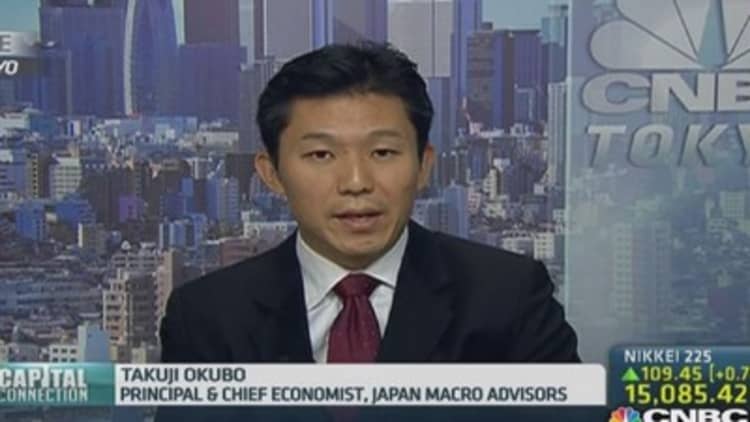The unprecedented quantitative easing (QE) program the Bank of Japan launched last year to revive the country's stalled economy could be at risk of failure, Oxford Economics says.
"Economic activity has indeed picked up since the QE program began early last year, but there are now serious warning signs that this progress may not be maintained," Adam Slater, senior economist at Oxford Economics wrote in a report.
The central bank's large-scale asset purchases were designed to boost money supply growth, asset prices and inflation expectations while holding down interest rates. However, broad money growth slowed markedly in recent months and is now negative in real terms, a clear danger sign.
Read MoreJapan's celibacy issue-What's the economic cost?
"Higher inflation expectations have done little to boost credit demand so far, as continued aversion to debt among firms and households may be blunting the effectiveness of this channel," he said.
In May, the broadest money supply measure grew just 2.7 percent on year, according to Oxford Economics. With headline inflation running at 3.2 percent in May, real broad money growth is negative.
"This risks generating a significant economic slowdown – a slowdown in real broad money growth was a lead indicator of the downturns in 1998, 2005, 2009 and 2012," Slater said.
Nikkei, yen movements stall
Meanwhile, the impact of monetary stimulus on asset prices is waning. QE aims to boost economic activity through shifting asset prices; for Japan, the two key prices are the stock market and the exchange rate.
Read MoreDoes Japan's currentaccount spell danger for the yen?
"Both of these asset prices have moved the 'right way' as a result of the QE program – stocks are up, and the exchange rate is down. But the big moves were a year ago or more, so the impact is starting to wane," Slater said.
Japan's benchmark Nikkei 225 has declined over 6 percent so far this year, after rising nearly 60 percent last year. The yen, meantime, has appreciated over 3 percent against the U.S. dollar, following 21 percent depreciation last year.

A weaker yen is positive as it increases the competitiveness of Japanese exports.
"[Bank of Japan Governor] Kuroda has to have a weaker yen as we go forward because they are just not going to meet their inflation targets. I think he'll need to do more stimulus to get it," said Paul Donovan, senior global economist at UBS Investment Bank, noting that the timing of the stimulus remains unclear.
It seems that Kuroda is trying to downplay expectations of further accommodation so that when the BOJ decides to act, it will have a greater impact on markets, Donovan said.
"Perhaps that's what the FX markets need," he said.
Time is ticking for fresh stimulus
According to Slater, the Bank of Japan's failure to add further stimulus has left the economy "dangerously exposed."
Read MoreBad trade data castsa cloud over Japan
"The Bank of Japan should have ensured that monetary stimulus was sufficiently strong to offset the drag from the consumption tax rises. Recent developments in broad money and credit suggest they have failed to do so, and recent communications do not suggest any urgency on the part of the BOJ to act," he said.
"The case for delaying the second planned consumption tax rise (scheduled for 2015) is growing increasingly strong," he added.
Ultimately, the BOJ's inaction risks turning the QE program from a qualified success into a failure.
"We have long expected the BOJ to add to its QE program but had generally assumed this would be a measured decision aimed at heading off lingering downside risks to growth and inflation. Now, the danger is increasing that this will instead be a tardy response to a significant deterioration in economic conditions," he said.


